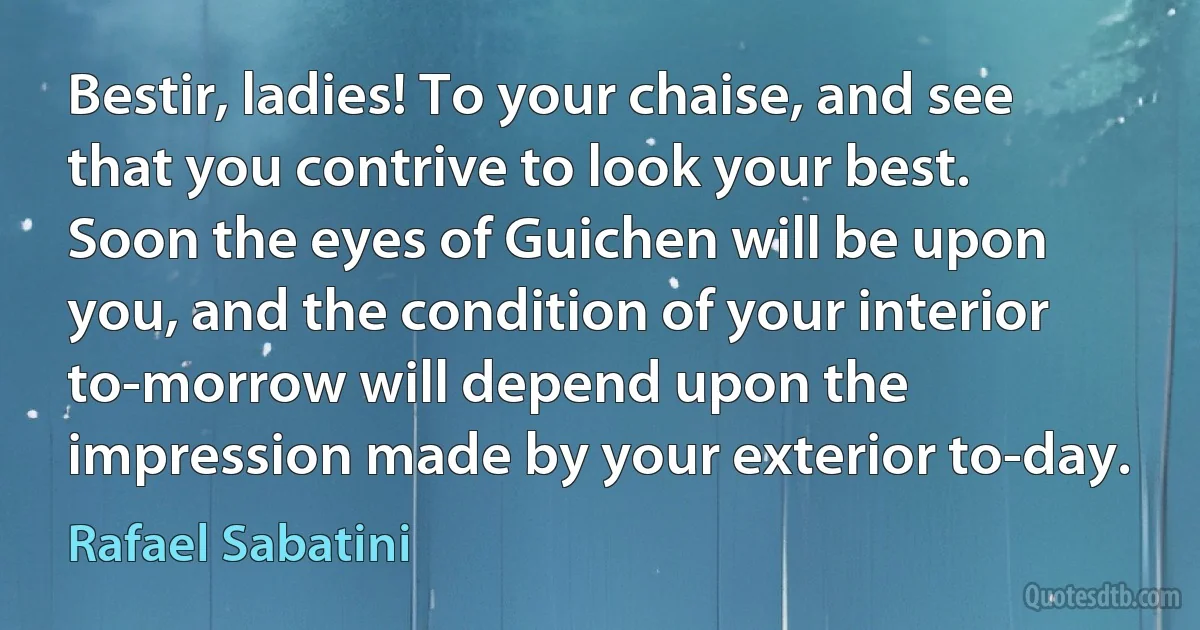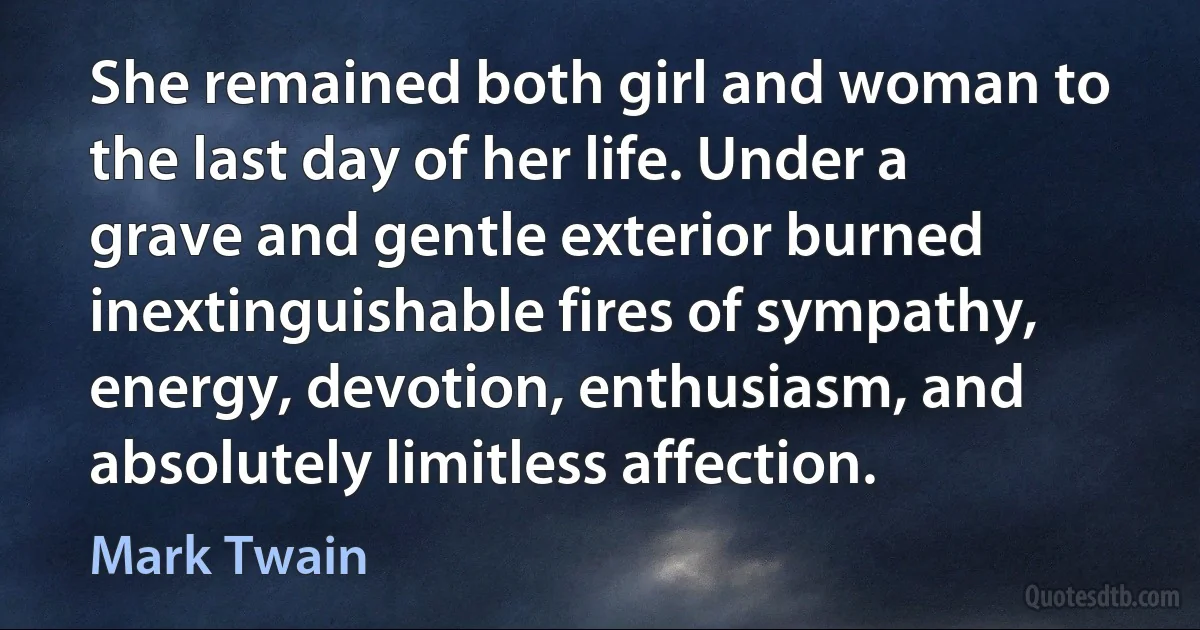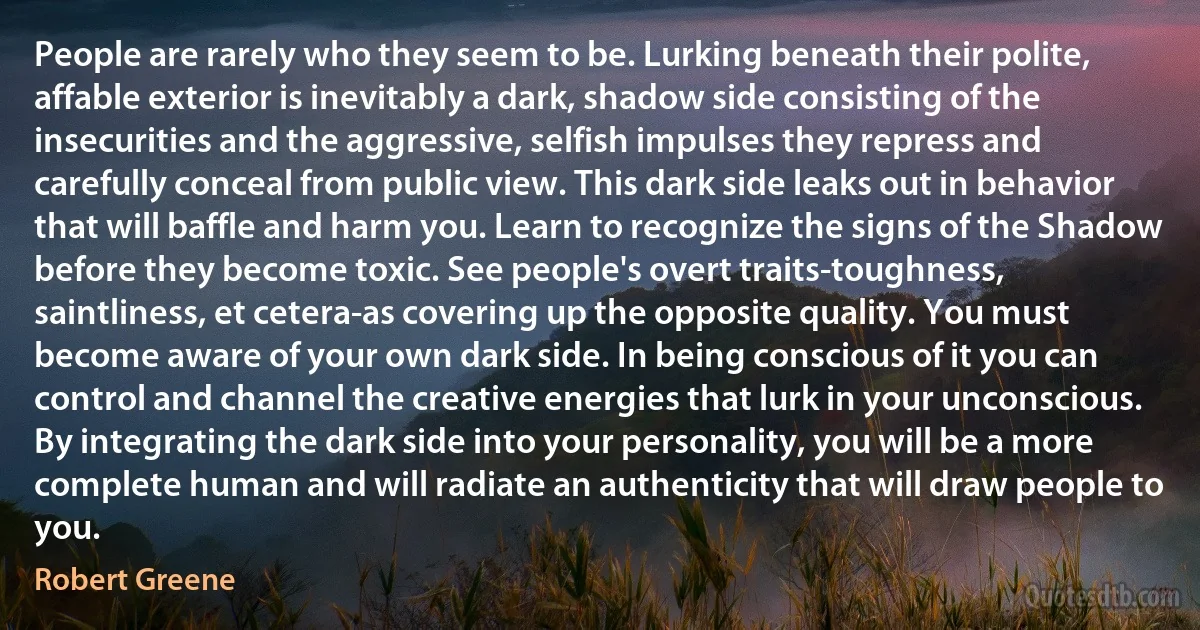Exterior Quotes - page 3
It was cool and quiet in here because instead of windows there were cosmoramic projections, latest of late devices to prevent the intrusion of untasteful exterior reality. Nearby the chimneys reeked a twenty-four-hour day yet the view was of clean white clouds, blue sky, yellow sun not so bright that it dazzled. Superior to the natural article, yes. Also birds flew or perched between two layers of glass on real branches in air-conditioned environment. It was not ordinary to see birds. Very yes.

John Brunner
Until now, exterior (or external) authority still domine (or is the dominant feature) too much in the relationships between men, as well as in their spiritual life. This is due to (comes, - "provient de", Fr.) the fact that we regard authority, in all fields, as being what makes (or simply, is) the law ("comme étant ce qui fait loi", Fr.), because in the empirical field, it is always what come first (or take precedence), may it be a force, an individual or an argument, that is winning.

African Spir
It might help if you imagine an inner living dimension within yourself in which you create, in miniature psychic form, all the exterior conditions that you know. Simply put, you do exactly this. Your thoughts, feelings and mental pictures can be called incipient exterior events, for in one way or another each of these is materialized into physical reality.

Robert Butts
So the concept of God began to change as the ego recognized its reliance upon inner reality, but the drama had to be worked out within the current framework. Muhammadanism was basically so violent precisely because Christianity was basically so gentle. Not that Christianity was not mixed with violence, or that Muhammadanism was devoid of love. But the psyche went through its developments and battled with itself, denying some feelings and characteristics and stressing others, so the historic religious exterior dramas represented and followed these inner aspirations, struggles, and searches.

Robert Butts
Your experience in the world of physical matter flows outward from the center of your psyche. Then you perceive this experience. exterior events, circumstances and conditions are meant as a kind of living feedback. Altering the state of the psyche automatically alters the physical circumstances. There is no other valid way of changing physical events. It might help if you imagine an inner living dimension within yourself in which you create, in miniature psychic form, all the exterior conditions that you know. Simply put, you do exactly this. Your thoughts, feelings and mental pictures can be called incipient exterior events, for in one way or another, each of these is materialized into physical reality.

Robert Butts
There is the name and the thing: the name is a voice which denotes and signifies the thing; the name is no part of the thing, nor of the substance; 'tis a foreign piece joined to the thing, and outside it. God, who is all fulness in Himself and the height of all perfection, cannot augment or add anything to Himself within; but His name may be augmented and increased by the blessing and praise we attribute to His exterior works: which praise, seeing we cannot incorporate it in Him, forasmuch as He can have no accession of good, we attribute to His name, which is the part out of Him that is nearest to us. Thus is it that to God alone glory and honour appertain; and there is nothing so remote from reason as that we should go in quest of it for ourselves; for, being indigent and necessitous within, our essence being imperfect, and having continual need of amelioration, 'tis to that we ought to employ all our endeavour.

Michel de Montaigne
The inner ego always identifies with its source-identity as a beloved, individualized portion of the universe. It is aware of the universal love that is its heritage. It is also aware of the infinite power and strength that composes the very fabric of its being. Through being made aware of these facts, the exterior ego can begin to feel a quicker sense of support and nourishment. The knowledge can let it relax, let go, so that it feels its life couched and safe, and knows itself to be indeed a beloved child of the universe, both ancient and young at once, with an identity far beyond the annals of time. It is of great value, then, that each person remember this universal affiliation.

Robert Butts
We can only assert here, with especial satisfaction, that Gabriele Münters talent, robust, rooted in an inward strength and sensitivity, in fact genuinely German, should in no circumstances be assessed as masculin, or as 'quasi-masculine'. This talent – and we emphasize it, once more, with great satisfaction – can only be described as exclusively and purely feminine... Gabriele Münter doesn't paint feminine subjects, she does not work with feminine materials, and does not permit herself any feminine coquetry. Their are neither raptures, nor agreeable exterior elegance, nor appealing weaknesses to be found here.

Wassily Kandinsky
Has not experience demonstrated quite recently that Jack the Ripper performed his exploits under the eye of the London police - a most active force - and that he only left off killing when the population of Whitechapel itself began to give chase to him?
And in our every-day relations with our fellow-citizens, do you think that it is really judges, gaolers, and police that hinder anti-social acts from multiplying? The judge, ever ferocious, because he is a maniac of law, the accuser, the informer, the police spy, all those interlopers that live from hand to mouth around the Law Courts, do they not scatter demoralization far and wide into society? Read the trials, glance behind the scenes, push your analysis further than the exterior facade of law courts, and you will come out sickened.

Peter Kropotkin
Sometimes I look at the battered exteriors of apartment buildings in New York and think how these sorry shells have housed such a long procession of styles. The money! The effort! One tenant mirrors everything, the next panels the walls, the third lines them with mylar, the fourth turns to toile de Jouy, the fifth to pegboard or handblocked rice paper. The expensive if often shoddy interiors installed only to be dismantled, the exterior left untouched as it turns yet another shade sootier - this transience seems a fitting emblem for the way we stay up-to-date without ever changing.

Edmund White
The boy was fully occupied with his own cogitations for the remainder of the ride, till we halted before the farmhouse garden gate. I watched to catch his impressions in his countenance. He surveyed the carved front and low-browed lattices, the straggling gooseberry bushes, and crooked firs, with solemn intentness, and then shook his head; his private feelings entirely disapproved of the exterior of his new abode. But he had sense to postpone complaining - there might be compensation within.

Emily Brontë
If any man could arrive at the exterior limit, or take the wings of a bird and fly upward, like a fish who puts his head out and sees the world, he would see a world beyond; and, if the nature of man could sustain this sight, he would acknowledge that this was the place of the true heaven and the true light and the true stars. For this earth, and the stones, and the entire region which surrounds us, are spoilt and corroded...

Socrates
Between the ages of 11 and 13 a series of psychic and spiritual experiences revealed to me not only the existence of God, but man's possibility of uniting with Him, of realising Him integrally in consciousness and action, of manifesting Him upon earth in a life divine. This, along with a practical discipline for its fulfilment, was given to me during my body's sleep by several teachers, some of whom I met afterwards on the physical plane. Later on, as the interior and exterior development proceeded, the spiritual and psychic relation with one of these Beings became more and more clear and frequent.

The Mother



